096 CD / Ilse Fromm-Michaels: Sämtliche Klavierwerke
Ilse Fromm-Michaels
Sämtliche Klavierwerke
Complete Piano Works
Babette Dorn, piano
EAN/barcode: 4009850009603
Description
Ilse Fromm-Michaels (1888 - 1986) was a famous female pianist and composer at the beginning of the 20th century. 1933 she was completely banned from pursuing her career, because she refused to abandon her jewish husband. She was not allowed to perform in public. None of her works could be played or published. The results of this discrimination can be felt up to the present day.
12 reviews for 096 CD / Ilse Fromm-Michaels: Sämtliche Klavierwerke
You must be logged in to post a review.

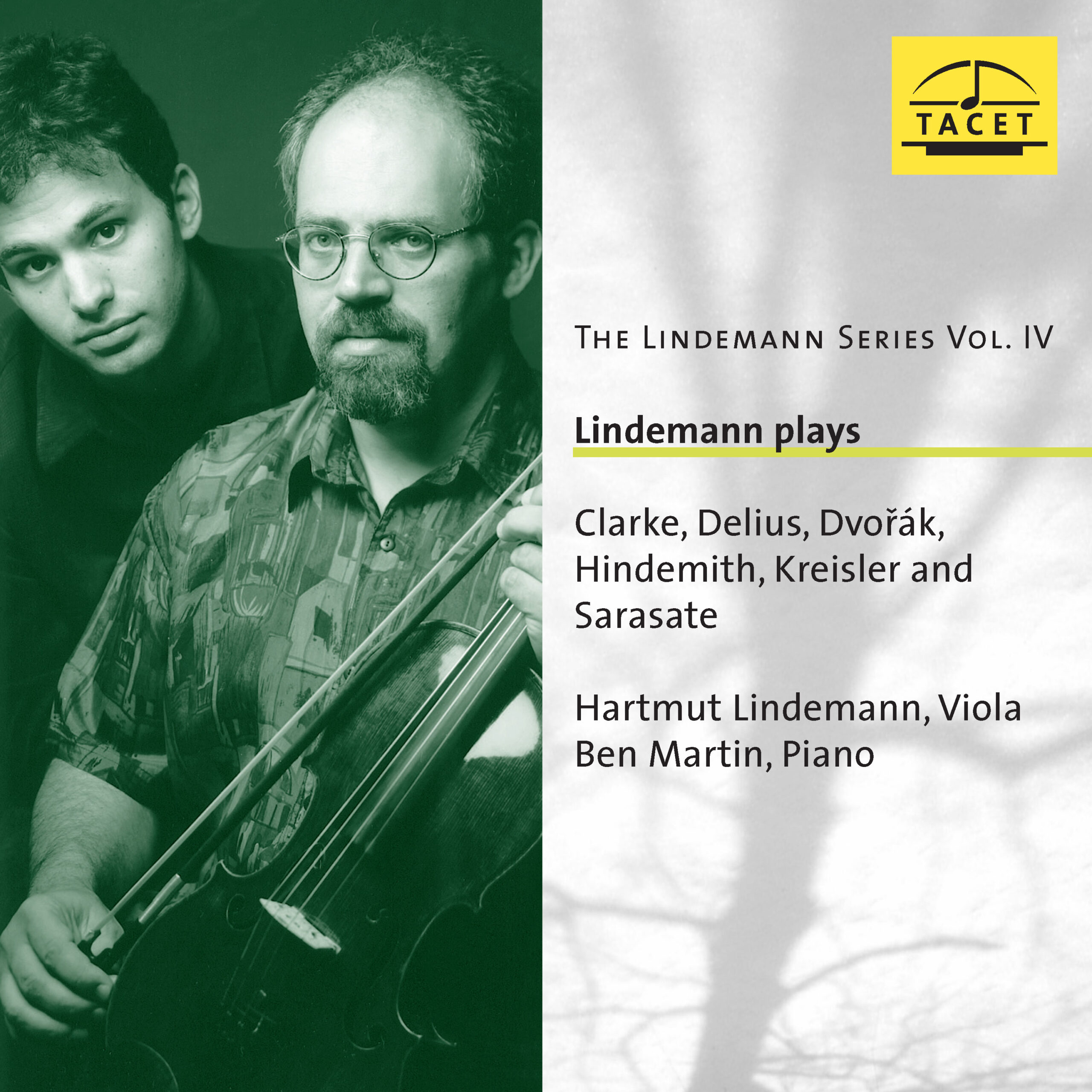
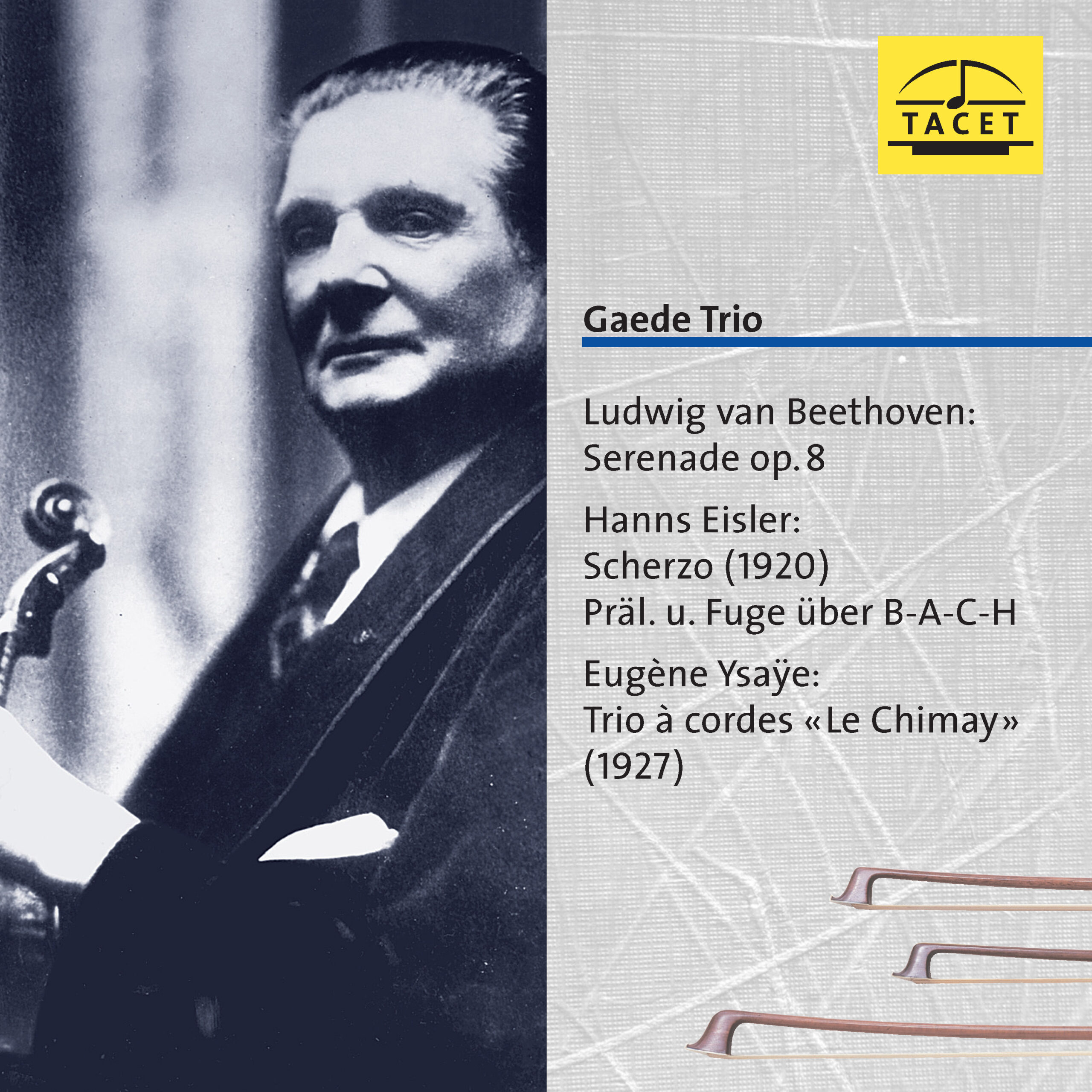
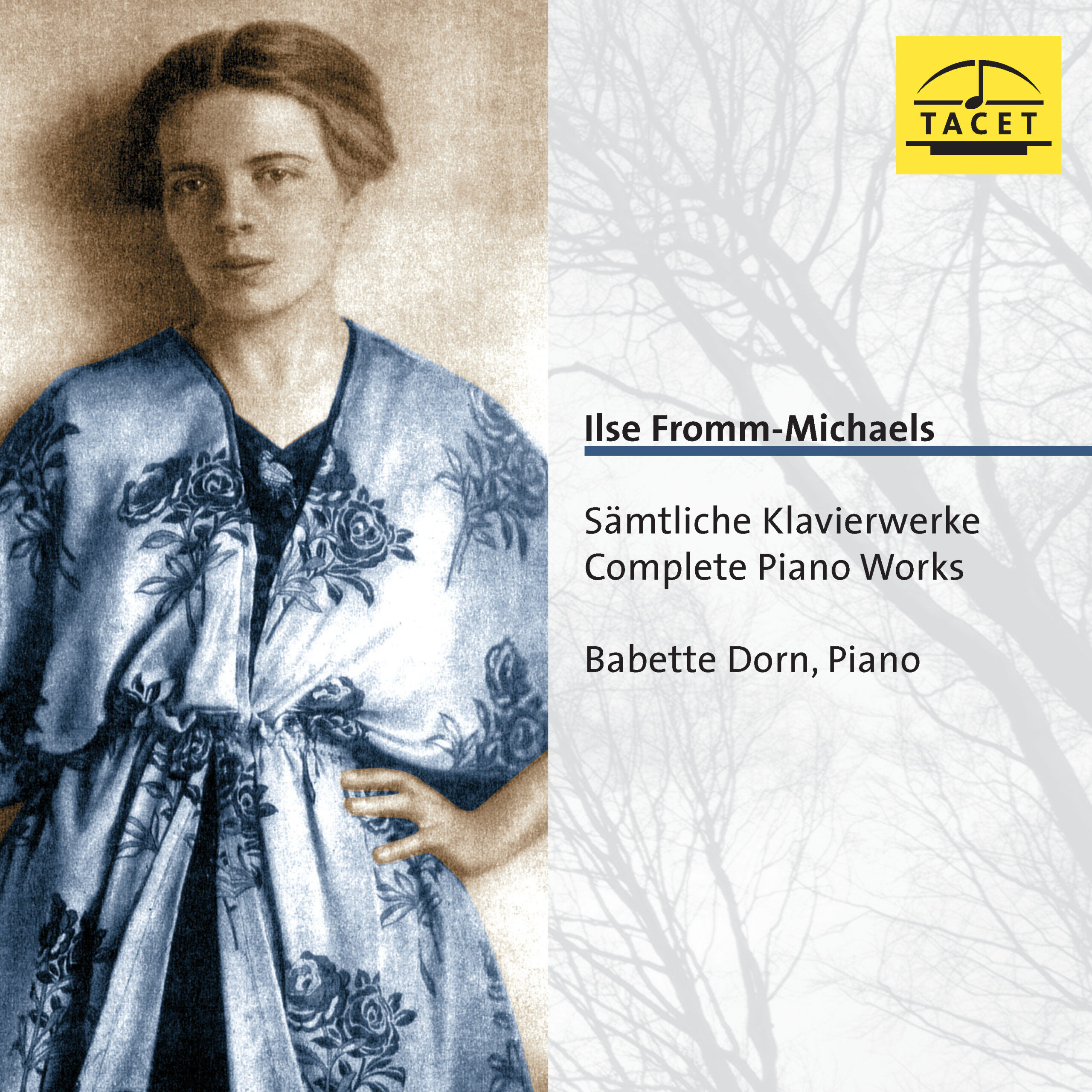
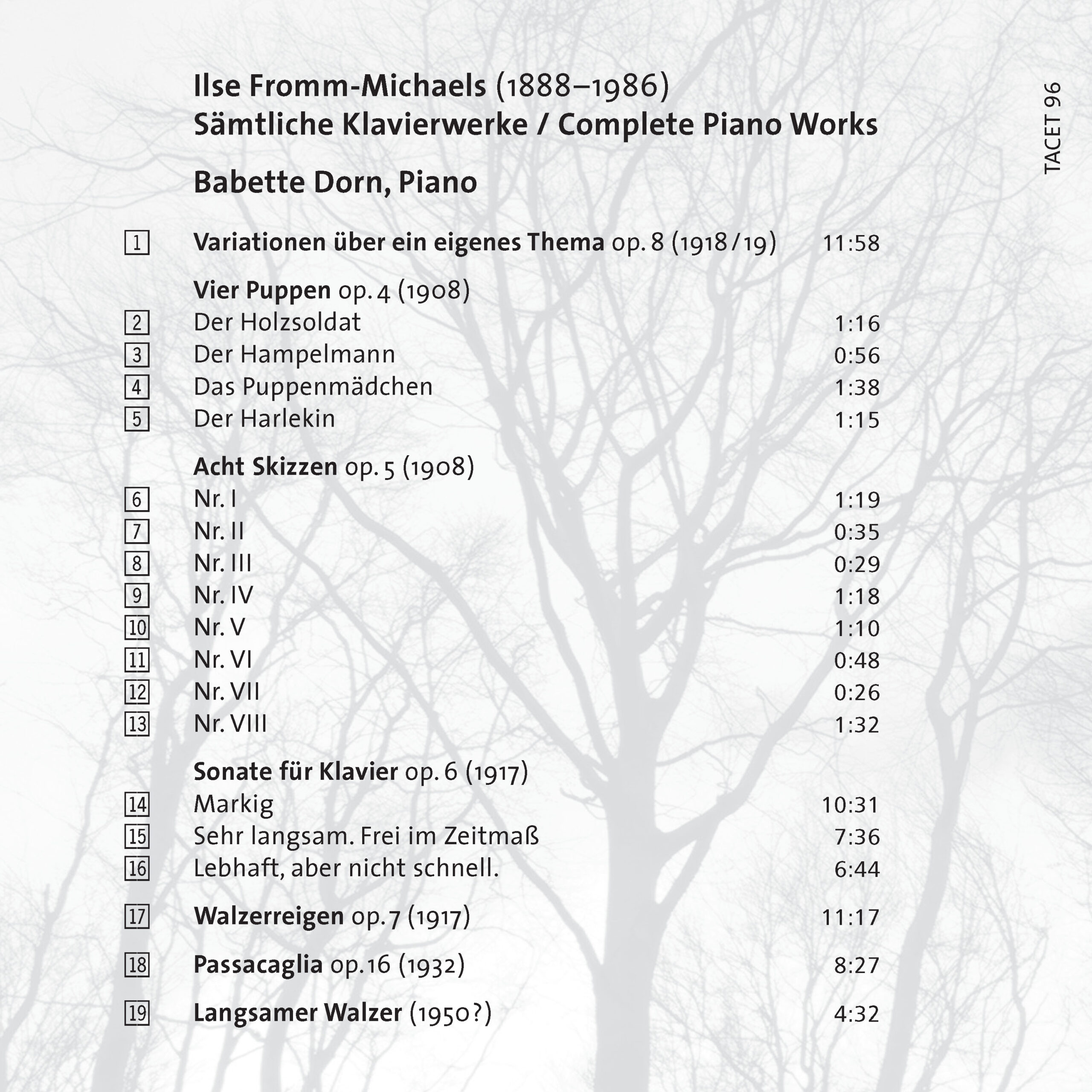






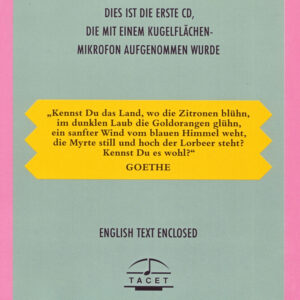
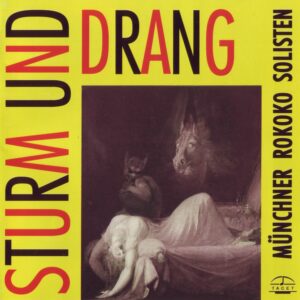


Fono Forum –
A Classic of Modernism
This is not about advocating for women composers—it’s simply about honoring an outstanding artist who, like Grete von Zieritz, is a classic of modernism and championed her contemporaries as an interpreter. Early piano works such as Four Dolls or the Eight Sketches resonate as character pieces deeply rooted in the 19th century, evoking Schumann and Brahms, while the 1917 Sonata carries the palpable breath of World War I. Even when Ilse Fromm-Michaels, whose mastery of form is so assured and whose gravity so profoundly moving, turned to a Waltz Round, the dance became, in the spirit of Schubert, a joy tinged with melancholy.
Emma –
During the Nazi era, she was banned from her profession because her husband was Jewish. Later, like so many female composers, she faded into obscurity. The fact that the works of Ilse Fromm-Michaels (1888–1986) are now reaching an audience is thanks to Babette Dorn. The award-winning pianist visited Fromm-Michaels’ son, obtained the compositions from his mother’s estate, and has now recorded these forgotten sounds on CD for the first time. Through her piano works, the composer traverses the entire spectrum of Western music. The informative and lively introduction in the CD booklet is also written by pianist Babette Dorn. A masterful achievement!
Eva Rieger
klassik-cd.org –
Anyone who loves Debussy must not miss this recording. And even those who at least appreciate Debussy should take a few hours to immerse themselves in the piano works of pianist and composer Ilse Fromm-Michaels. Her life story is also a part of German history. Born in 1888, she experienced World War I, and the horror of that time is palpable in her 1917 Sonata, her most extensive piano work. The Nazi era meant a period of internal exile for Ilse Fromm-Michaels. She was forbidden to perform, and her works were banned. She never recovered from these experiences. After the war, she found her calling as a professor of piano at the Hamburg University of Music. Ilse Fromm-Michaels passed away in 1986. This CD is an excellent representation of her artistic legacy.
Andre Busche
Crescendo –
A woman as a piano teacher? Nice. A woman as a concert pianist? Also nice. A woman as a composer? Was there something? Even with Ilse Fromm-Michaels (1888–1986), her concert career and pedagogical work took center stage. The composer’s oeuvre is slender, especially since the Nazis imposed a professional ban on her, and she nearly “fell silent” afterward. Fromm-Michaels is rooted in late Romanticism, but between the sketches of her twenties and the late Slow Waltz, sensitively interpreted by Babette Dorn, an individual musical path unfolds. Tonality and expression become freer, more serious, and harder. This is already evident in the works created at the end of the war, including the 1917 Sonata. Impressive!
JH
Rondo. Das Klassik & Jazz Magazin –
A prim, elderly lady with an equally prim double-barreled name gazes out at us from the photos, and to prevent smug condescension (“Are feminist musicology dissertation topics running low?”) from taking root, one should immediately turn to the Piano Sonata, Op. 6. It is one of those compositions that makes us wonder why on earth no one knows it today. Hans Pfitzner and Max Reger were the models for the composer, born in Hamburg in 1888, yet this twenty-five-minute, intensely dense, and emotionally charged music far surpasses the “Regerisms” that occasionally surface in her earlier piano works, also featured on this CD. The 1917 Sonata sounds so dark, so mystical, as if the composer had already discovered Scriabin (the Second Sonata!) by then. The booklet notes that after hearing her perform this sonata, conductor Artur Nikisch immediately engaged the young pianist as the soloist for Rachmaninoff’s Third Piano Concerto in 1918. The anecdote hints at the pianistic power of this piece. The young pianist Babette Dorn masters the late-Romantic, complex, and at times almost hypertrophic writing with a sovereignty and sonic imagination that far exceed the usual standards of rarity productions. After 1945, Ilse Fromm-Michaels—who died in 1986 at the age of 98—fell silent. With this CD, we rediscover her works, and she doesn’t need the label of “female composer” or “forgotten artist,” which is often used to justify the exhumation of questionable material. We are confronted with mature, refined creations.
Matthias Kornemann
Otto-Ackermann-Archiv aktuell –
There are records (and CDs) about which one can’t really say much because, from every angle, they are simply perfect. Babette Dorn’s recording of Ilse Fromm-Michaels’ complete piano works belongs to this (rare) species… Throughout, it is also an exceptionally feminine interpretation—with a touch of imagination, one might even draw a comparison to the way Clara Haskil played Mozart and Schubert!
Gert Fischer
VivaVoce –
...This CD was truly overdue.
Klassik heute –
The few compositions that survived her merciless self-criticism and were not destroyed astonish with their striking density and expressionist intensity…
Peter Schlüer
Piano News –
… Like a memory of what was lost, the late Slow Waltz arrives at the end. It carries something reconciliatory… An impressive woman, interpreted here by an equally impressive woman.
Helmut Peters
Ongaku no sekai (Japan) –
Fromm-Michaels: A Quiet Resister
A CD by an unknown composer. "All piano works on a single CD? … Very compact! 1888–1986, oh, she lived that long … But who is she, really? I’ve probably heard that name before…" That was the impulse to pick up the recording of Ilse Fromm-Michaels’ piano works (TACET 96, piano: Babette Dorn). Born in Hamburg, she studied composition and piano in Berlin. One of her teachers was Pfitzner, and among her fellow students was Otto Klemperer, with whom she later performed. Fromm’s future seemed bright: she collaborated with Nikisch, Furtwängler, and Schuricht. Even Max Reger admired her performance of his Bach Variations. While actively championing modern works by Bartók, Stravinsky, and the Second Viennese School, she continued composing. But fate struck hard: because her husband was of Jewish descent, the Nazis dismissed him from his position. Fromm was banned from performing. Had she divorced him, she might have continued her career. But she endured. The couple survived the war, though her husband died soon after. She resumed performing briefly, only to abandon it for teaching. She once said: "After that time, all foundations were lost. My friends died, I had no more connections." But there were likely deeper reasons. Perhaps avant-garde music felt alien, inaccessible. Gazing at postwar Germany, obsessed with economic recovery, she must have wondered: "What were two world wars? What meaning does our suffering hold?" It seems her profound loneliness drove her silence. This CD features seven pieces. Early works like Four Dolls and Eight Sketches bear the influence of Schumann’s character pieces. The Variations on an Original Theme pay homage to Schumann and her compatriot Brahms, yet their harmony moves in such a modern way that one thinks of Scriabin. The Piano Sonata (1917) is striking for its barcarolle-like sound. Its desperate, heavy rhythm conveys a sense of hopelessness—an image of an impenetrable cold wall blocking the path. No detour. One knows it cannot be overcome, yet one must forever push against it… Listening to the Slow Waltz, the listener is swept away by its quiet, clear sorrow. All the works here are more melancholic than dramatic, awaiting an empathetic ear. But once one learns to listen to this quiet voice, one will be deeply moved.
Yutaka Oyamada
Yorkshire Post –
Performance: ★★★★★
Recording: ★★★★★
Marriage to a Jew brought artistic prosecution to Ilse Fromm-Michaels, performances of her music banned by the Nazi party. She and her husband survived the war, but her desire to write had been broken. This beautifully performed and recorded disc of her complete piano works shows a composer of great distinction. The charme of her pictures of four dolls is set beside the rugged strength of the Sonata from 1917, and a real sense of humour in the Waltz Round. An unknown composer that I urge you to hear.
Classics Today –
Reference Recording: "This one"
The composer/pianist Ilse Fromm-Michaels was based in Hamburg throughout most of her long life (born in 1888, she lived to be 98). At the famous Stern Conservatory, where she befriended a fellow pupil named Otto Klemperer, Fromm-Michaels studied piano with James Kwast and composition with Hans Pfitzner. Max Reger wrote her a letter of recommendation on hearing her play his monumental Bach Variations. She must have been a big player in order to tackle fingerbusters like the Busoni and Reger Concertos, as well as the Rachmaninov Third. She was invited to play the latter under Artur Nickisch after he had heard Fromm-Michaels play her own Piano Sonata, the largest-scaled work among her complete piano oeuvre.
In the main, her piano writing owes as much to Rachmaninov′s swirling filigree as it does to her mentor Pfiztner′s crabby chromaticism. If the Walzerreigen Op. 7 seems to regress toward Brahms′ lilting wistfulness, her 1932 Passacaglia is forged from an ascetic blueprint that flirts with atonality. There′s also an intriguing set of variations on an original theme, plus two youthful books of miniatures. Fromm-Michaels′ final piano work was a nostalgia-laden Waltz penned around 1950 that might fit into a Kreisler folio or a Korngold opera.
Babette Dorn′s solid pianism and excellent musicianship make a convincing case for the revival of Fromm-Michaels′ essentially derivative yet ultimately rewarding keyboard output. Should an enterprising label undertake her 1938 Symphony or Music Larga for clarinet and string quartet, I′ll be there to listen.
Jed Distler